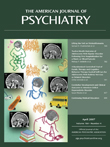Increased Waking Salivary Cortisol Levels in Young People at Familial Risk of Depression
Abstract
Objective: Cortisol hypersecretion is one of the most reliable biological abnormalities in major depression, but it is uncertain if it represents an illness marker or a trait vulnerability to mood disorder. The present study sought to answer this question by measuring waking salivary cortisol levels in young people at familial risk of depression but with no personal history of mood disorder. Method: The authors studied 49 young people who had not been depressed themselves but who had a parent with a history of major depression (FH+) and a comparison group of 55 participants who had no personal history of depression and no reported depression in a first-degree relative. The authors measured the amount of cortisol secreted in saliva during the first 30 minutes after awakening on a workday and on a nonworkday. Results: The amount of cortisol secreted by the FH+ subjects was greater than that of the comparison subjects on both workdays (mean=698 nmol×minutes/liter, SD=243, versus mean=550, SD=225) and nonworkdays (mean=633 nmol×minutes/liter, SD=216, versus mean=492, SD=166). The increase in cortisol secretion was not accounted for by differences in parental attachment, life events, personality, or current mental state. Conclusions: Hypersecretion of cortisol can be detected in asymptomatic individuals at genetic risk of depression and may represent an illness endophenotype. Further studies will be needed to find out if increased waking salivary cortisol levels can predict individual risk of illness and whether the increased cortisol secretion has implications for general health and cognitive function.



